With the upcoming Digital and DVD/Blu-Ray release of Stevan Riley’s hit documentary Listen To Me Marlon on 30th November, we explore Marlon Brando’s most significant and unforgettable on-scene moments. All excerpts below are in his own words and taken directly from the film.
A Streetcar Named Desire

‘It was a very explosive part. And it electrified everybody. And then your life changes. Suddenly there’s a lot more girls saying “Hi, Mar”.
This 1951 drama written by Tennessee Williams is arguably the film that put Marlon Brando on the Hollywood radar. With elements of film noir, the film shows Brando as the threatening Stanley who makes life for his sister-in-law a living hell. The film marked the first of Brando’s four consecutive Academy Award nominations for Best Actor, and in 1999, A Streetcar Named Desire was selected for preservation in the United States National Film Registry for being “culturally, historically, and aesthetically significant”.
Julius Caesar
In this definitive 1953 Metro-Goldwyn-Mayer adaptation of the infamous Shakespeare classic, Brando’s casting was met with some scepticism. Cast as Mark Antony, he had earned the nickname of ‘The Mumbler’ in previous roles and felt he had something to prove. His performance turned out so well that the New York Times proclaimed “In him a major talent has emerged.” He would later be offered a role in Hamlet following the success of Julian Caesar, a role which he would surprisingly turn down.
The Wild One

Labelled as the original outlaw biker film, The Wild One is most noted for Marlon Brando’s character, Johnny Strabler, whose persona became a cultural icon of the 1950’s. Always one to make an impact, Brando’s haircut in the film inspired a new craze for the side burn, which was later emulated by James Dean and Elvis Presley. The biker jackets worn by Brando and his Triumph Thunderbird 6T motorcycle eschewed society’s expectations and established the “rebel” biker image. Significantly, the film was banned in the UK by the British Board of Film Censors for fourteen years, before receiving an X certificate in the 60’s. It was finally seen in the UK at the 59 Club in Paddington in 1968.
On The Waterfront

‘It’s a very strange thing this business of story-telling. The person up on the screen is doing all the things that you want to do. They’re kissing the woman you want to kiss. Being braver in a way that you wanna be brave. The audience does the work.’
Winning the role of Terry Malloy over Frank Sinatra, Brando’s role in On the Waterfront was ‘a critical and commercial success’. Winning an Oscar for his performance, the film has proven symbolic in American culture. Receiving 12 Academy Award nominations, On The Waterfront was ranked by the American Film Institute as the eighth-greatest American movie of all time.
Mutiny on the Bounty
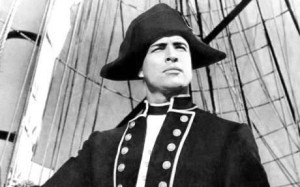
Mutiny On The Bounty was perhaps my very worst experience of making a motion picture. I never wanna do that kind of picture again as long as I live.’
Set in Tahiti, Brando’s favourite part of the world, Mutiny on the Bounty proved more difficult than previous titles. Many felt that Brando de-railed the film, and that he wasn’t the right actor for the part. Nevertheless, this 1962 historical drama proves significant for Brando, as he fell in love with not only the setting, but also his co-star Movita Castaneda would later become his wife.
Last Tango in Paris
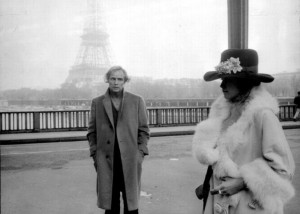
‘Last Tango In Paris’ was a very hard film for me. I realised, you know, “You’re naked, Marlon”. In perhaps his most emotional role to date, Last Tango in Paris oozes sensuality and erotic drama. Emotional turmoil and sexual violence meant that the film had various scenes initially cut, causing controversy in the USA. Brando infamously decided not to learn his lines for the role, and insisted on placing cue cards around the set making it difficult for the director to hide them from the picture frame.
Superman

‘I have made as much as $14 million for 12 days’ work … … on a rather silly movie. I used to paste the cue card on actors’ faces. It saved me a lot of time … ‘
When Brando was cast as Jor-El in the 1978 hit Superman, he knew he was a real star – and so did the rest of the world. He was paid millions for the role, and the film went on to break box office records, making $300 million in its initial theatrical run.
Apocalypse Now

‘I re-wrote the entire script … … and I have it all on tape. I have a tape of everything. He should be mysterious. A mythological figure. He is the heart of darkness.’
Apocalypse Now is known to many critics as being ‘one of the greatest movies of all time’. Marlon, however, proved to be difficult and demanding on set. He had put on weight, shaved his head and hadn’t learnt any of his lines. In fact, he had been creating his own script behind the scenes! Despite this, the film is a significant attribute to the film industry and was honoured with the Palme d’Or at Cannes Film Festival.
The Godfather

‘I thought it would be interesting to play a gangster not from the point of view that he was the bad guy but that he was very gentle. A hero.’
After a series of controversial films, Marlon Brando came back to brilliance in his role for The Godfather. Creating the perfect mob look, Brando stuffed cotton balls in his cheeks and smoothed shoe polish in his hair. The film was a critical hit, and Marlon again shocked the nation when he declined to accept his Oscar award. Instead, he sent an American Indian Rights activist to the stage, in a demonstration to highlight his concerns for the treatment of American Indians in Hollywood.
Listen To Me Marlon
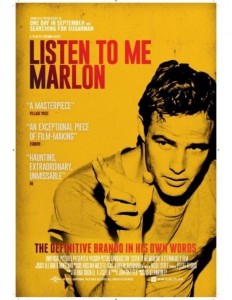 From British director Stevan Riley (Fire in Babylon, Everything or Nothing) and award-winning producer John Battsek (Searching for Sugarman, Restrepo) comes LISTEN TO ME MARLON – an insightful, captivating portrait of one of the most iconic and complex individuals of this century. LISTEN TO ME MARLON is a creative odyssey into the mind and motivations of Marlon Brando. Brando’s own voice leads the storytelling, making this the most honest portrayal of a screen legend we have ever seen.
From British director Stevan Riley (Fire in Babylon, Everything or Nothing) and award-winning producer John Battsek (Searching for Sugarman, Restrepo) comes LISTEN TO ME MARLON – an insightful, captivating portrait of one of the most iconic and complex individuals of this century. LISTEN TO ME MARLON is a creative odyssey into the mind and motivations of Marlon Brando. Brando’s own voice leads the storytelling, making this the most honest portrayal of a screen legend we have ever seen.
The film’s undercurrent and final note will be one of celebration, homage to a creative genius. The film is emotionally complex, revealing and insightful, but ultimately playful and surprising, moving between harmonious and discordant notes with eccentric virtuosity. An homage to Marlon himself, this film sees his best role to date.
‘Listen To Me Marlon’ is out now in UK cinemas and on Digital HD, and will be out on DVD and Blu-Ray from 30th November.

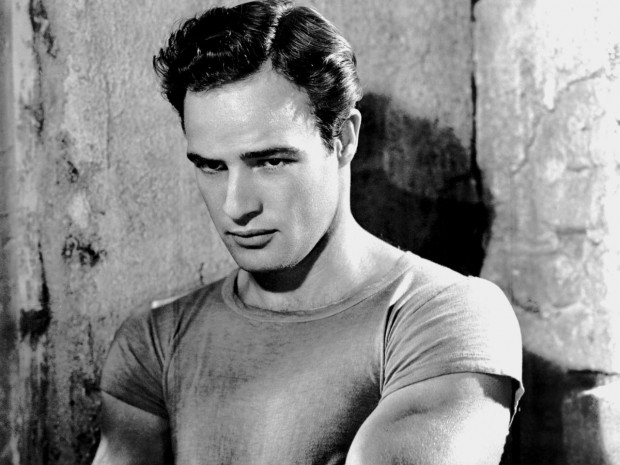
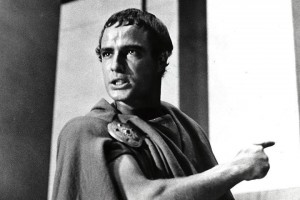

















No Comments